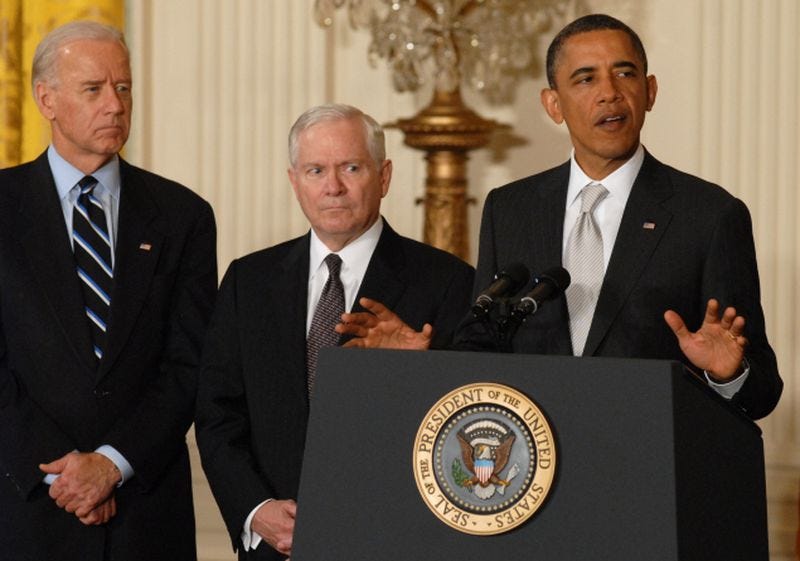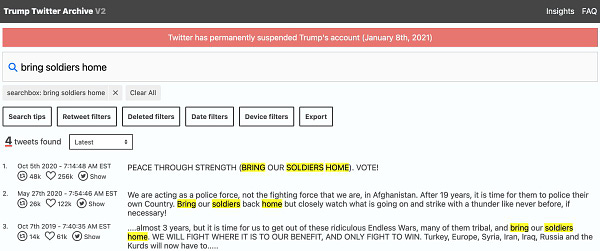A Ballsy President and His Historic Airlift
The real story of the Afghan endgame was the astonishing evacuation of 123,000 people in just 17 days
I’ve been trained to despise cliches, but most have at least a grain of truth.
“Controlling the narrative” is no exception.
The coverage of the end of the war in Afghanistan has been mostly controlled in recent weeks by talking heads who are locked into a narrative that is now obsolete. The facts on the ground changed, but their analysis stayed largely the same.
Historians will note the poignancy of the withdrawal from Kabul. Losing is never easy, and the stories of Afghans left behind are heartbreaking.
…as someone who was appalled at the failure of the Biden Administration in mid-August to orchestrate a more orderly retreat, I have to admit that I stand corrected.
But as someone who was appalled at the failure of the Biden Administration in mid-August to orchestrate a more orderly retreat, I have to admit that I stand corrected.
The endgame went from a fiasco to the fastest, largest and thus most successful evacuation of civilians in history. I didn’t say it was the smoothest of operations, or that the bureaucracy worked well, or that we didn’t leave thousands of people who helped Americans behind - only that the evacuation was much more successful than it looked in the middle of August.
Failing to recognize this dishonors the soldiers, former service personnel, diplomats, NGOs and others who worked 24/7 for 17 days in a miraculous joint operation.
Consider these two numbers:
86,000 and 123,000.
On August 17th, Matt Zeller, a former combat adviser in Afghanistan and heroic co-founder of No One Left Behind, a veterans organization dedicated to saving as many Afghan supporters as possible, made the rounds on MSNBC. He was scathing about Biden, and he seemed justified in his outrage. “I’m appalled that he [Biden] says we only need to take out 2,000 people [Afghan civilians],” Zeller told Brian Williams. There’s 86,000 people who are currently left behind in Afghanistan.”
Not anymore.
The U.S. military evacuated about 80,000 and NATO allies and private groups flew out another 40,000 for a total of more than 120,000—nearly one third more than Zeller pleaded for.
Now it may well be that in many cases we didn't evacuate the people who were in line to go. The Wall Street Journal reported that a mere 7,000 evacuees came out under the Special Immigrant Visa system, which will go down in history as a synonym for a horribly inefficient program. An Afghan interpreter who in 2008 helped then-Senator Joe Biden when his helicopter had to land in a snowstorm was among those left behind. (Ron Klain, White House Chief of Staff committed to evacuating the interpreter.
But for all of the confusion over who exactly got out, the fact remains that tens of thousands did--many times more Afghan supporters than we had any reason to hope for just a couple of weeks ago. And though Biden didn't keep his promise to evacuate every single American, he came damn close.
But for all of the confusion over who exactly got out, the fact remains that tens of thousands did--many times more Afghan supporters than we had any reason to hope for just a couple of weeks ago.
And though Biden didn't keep his promise to evacuate every single American, he came damn close. Americans living in Afghanistan were warned no fewer than 19 times this year that they needed to leave the country. More than 6,000 were evacuated, with only 100-200 or so remaining, mostly those with dual citizenship who changed their minds at the last minute, a circumstance the administration could not control.
You wouldn’t know it from the press coverage but this is a small number—and all of them will likely be allowed to leave in the days ahead, thanks to an arrangement with the Taliban.
After the 1979 Iranian Revolution, as I mentioned in my Carter biography, a surprising number of Americans chose to remain in Iran, including a colorful businessman named David Rabhan. Rabhan was thrown in prison in Iran for 10 years and no one in the American press cared—or bothered to find out that one of his closest friends was Jimmy Carter.
This time, there are sad stories of ruined lives but also cinematic stories of deliverance that we don’t even know yet, as veteran and former Missouri Secretary of State Jason Kander noted:

That’s the narrative we need now, not because it's the happier story the White House wants, but because it's the truth.
In the meantime, I have a question for Republicans who continue to attack Biden: Will you also attack Trump for his “surrender treaty” (Gen. H.R. McMaster’s term), which released 5,000 Taliban militants and forced Biden to choose between withdrawal and escalation? If not, you have zero authority to speak on this issue.
Nor do most of what Calvin Trillin in the 1990s called the “Sabbath gasbags.” These were the "experts" on the Sunday shows who were wrong about the war, wrong about the failure of the evacuation and are now wrong not to concede the slightest error when they’re on the air. Ross Douthat wrote a good column about the “delusional” comparisons that so many members of the foreign policy establishment continue to make between their support for an open-ended military presence in Afghanistan and U.S. troops in Japan, South Korea and Germany, where—last time I checked—suicide bombers weren’t killing marines. He offers a withering indictment:
Thus you have generals and grand strategists who presided over quagmire, folly and defeat fanning out across the television networks and opinion pages to champion another 20 years in Afghanistan. You have the return of the media’s liberal hawks and centrist Pentagon stenographers, unchastened by their own credulous contributions to the retreat of American power over the past 20 years. And you have Republicans who postured as cold-eyed realists in the Trump presidency suddenly turning back into eager crusaders, excited to own the Biden Democrats and relive the brief post-9/11 period when the mainstream media treated their party with deference rather than contempt.
As it happens, efforts to “scapegoat” (Douthat’s word) Biden have a long history. How many times in the last couple of weeks have you seen talking heads in both parties and in the news media quote former Defense Secretary Robert Gates writing in his memoirs that Biden has been wrong on “nearly every major foreign policy question” of recent years? As recently as May of 2019, Gates said he stood by that statement.
There’s only one problem with Gates’ take—now so firmly a part of “the narrative.”
It’s wrong.

In the fall of 2009, President Obama launched a thorough review of policy in Afghanistan. Gates, Hillary Clinton (Secretary of State), Admiral Michael Mullen (Chairman of the Joint Chiefs of Staff), General David Petraeus, General Stanley McChrystal and virtually everyone else in the Situation Room wanted Obama to send 40,000 (later scaled back to 30,000) more troops to Afghanistan and keep them there for a decade of counterinsurgency.
There was only one dissenter: Vice President Joe Biden.
…that wasn’t the only time Gates had it exactly backwards. It was he, not Biden, who was consistently proven wrong on other big questions
And that wasn’t the only time Gates had it exactly backwards. It was he, not Biden, who was consistently proven wrong on other big questions, as I explained in the New Yorker in 2014.
Obama knew it. In late 2009, I interviewed him in the Oval Office for my book “The Promise.” I asked him if he felt publicly “jammed” by the Pentagon before he made his Afghanistan decision. He replied, “I neither confirm nor deny that I’ve gotten jammed”—an extraordinary comment for an American President to make about his own administration.
This year, President Biden refused to get jammed. He ripped off the Band-Aid and took ownership of the end of the war, though it was his three predecessors who had launched and sustained it.


“Trump REPEATEDLY demanded that we bring our soldiers home but only President Biden had the balls to do it,” Ann Coulter tweeted.
I’m loath to give Coulter the last word. On the other hand—cliche alert—she has “a proven track record” of “changing the narrative.”






The problem Biden faced, Marla, was that the Taliban were advancing after what H.R. McMaster, Trump's former national security adviser, called Trump's "surrender deal." So Biden would have had to escalate our troop presence there to achieve what you suggest. There was virtually no public support for that and it would have been as futile ultimately as all the other escalations over the last 20 years. If we've learned one thing--and we haven't learned much--you can't keep going to war without public support.
Spot on. Monty